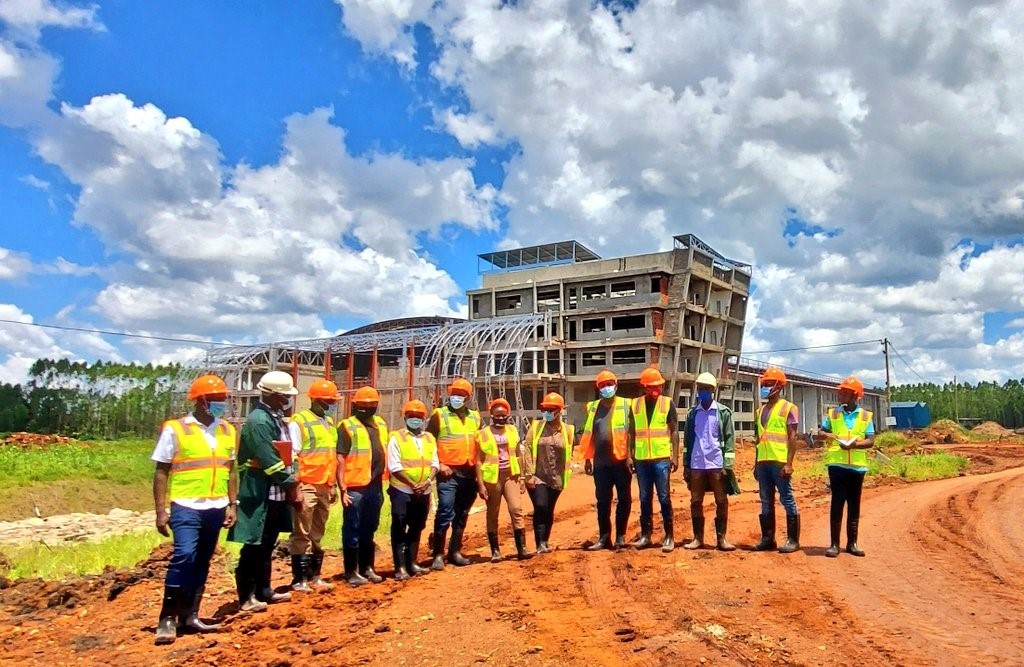By Sierra Ruth Arinaitwe
Kiira Motors Corporation hosted a team of technology and development enthusiasts who experienced the comfort of the luxurious Kayoola Coach during their ride to the Kiira Motors vehicle plant currently undergoing construction at the Jinja Industrial and Business Park.
Upon arrival at the plant, they were welcomed by Kiira Motors CEO Paul Isaac Musasizi with whom they had a rich engagement about the automotive industry and its contribution to Uganda’s development agenda. They were taken on a guided tour of the plant.
Tusiime Samson, a team leader at Veritas Interactive Uganda said his view of Kiira Motors was always based on a misconception which always clouded his judgment about the corporation.
“I had always been skeptical about what Kiira Motors is doing. This trip has been really informative and given me an insight of what is intended to transpire at Kiira Motors vehicle plant,” he said. “I am really impressed by the direction Uganda is taking in the automotive industry and the fact that Uganda has talent to manufacture products like the Kayoola Diesel Coach.”
Tusiime further stated that engagements with the Kiira Motors CEO and the visit to the plant informed him about what is on ground, what has always been communicated about Kiira Motors and as well rule out the misconceptions he had about Kiira Motors.
Daniel Bwambale, a judicial officer who also works at the Uganda Legal Information Institute said he always had questions whether Kiira Motors was simply “another Ugandan story.”
“My main reason for this trip was to prove that there is a plan, if the plan is under implementation and that the plan would come alive and not just die just like many other plans have died out in Uganda,” he said.
Bwamble referred to Kiira Motors Corporation as one of Uganda’s good stories that people should be told and with it, he believes that Uganda can do more.
Another automotive enthusiast and IT professional engineer with Yo Uganda Ronald Sebuhinja, says his main concern was to get a sense of scale of what Kiira Motors really does.
Sebuhinja says it was unclear to him what Kiira Motors is doing when it comes to vehicle manufacturing. “Visiting the plant gave me a clear plan of what is done at Kiira Motors and an idea of what will be done once the construction is complete and is in use.”
“I was really impressed by the human resource who have knowledge of whatever transpires here most especially by the speed and execution of work by NEC ( the construction company) who have been able to do such amazing work in a short period of time and am sure they will meet the deadline,” he said.
David Birungi, a Public Relations tutor at the University of Nairobi who also works with UMEME said before, he was a bit skeptical as he thought importing cars gave Uganda an advantage over manufacturing here. “After this trip, I have come to understand the Kiira Motors story and this has completely changed my thinking about Uganda’s automotive industry,” he said adding that he looks forwards to coming back to witness how vehicles will be built.
Jeremiah Ahumuza Birungi, a 12-year-old pupil at Kampala Parents School who was also the youngest enthusiast said he was looking forward to vehicles made in Uganda. “I am impressed by the progress of the plant. I can’t wait to see how it will look like once its complete,” he said.
The first phase of construction of the Kiira Motors vehicle plant is slated to be complete by this. Upon completion, it will be the new home of Kiira Motors Corporation from which it intends to build about 22 cars per day and about 5000 cars per annum.










